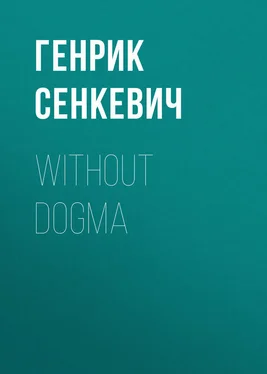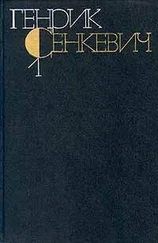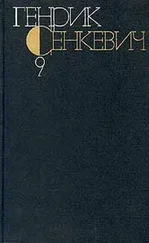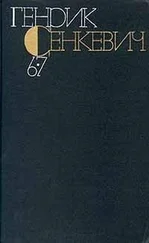Генрик Сенкевич - Without Dogma
Здесь есть возможность читать онлайн «Генрик Сенкевич - Without Dogma» — ознакомительный отрывок электронной книги совершенно бесплатно, а после прочтения отрывка купить полную версию. В некоторых случаях можно слушать аудио, скачать через торрент в формате fb2 и присутствует краткое содержание. Жанр: foreign_antique, foreign_prose, на английском языке. Описание произведения, (предисловие) а так же отзывы посетителей доступны на портале библиотеки ЛибКат.
- Название:Without Dogma
- Автор:
- Жанр:
- Год:неизвестен
- ISBN:нет данных
- Рейтинг книги:4 / 5. Голосов: 1
-
Избранное:Добавить в избранное
- Отзывы:
-
Ваша оценка:
- 80
- 1
- 2
- 3
- 4
- 5
Without Dogma: краткое содержание, описание и аннотация
Предлагаем к чтению аннотацию, описание, краткое содержание или предисловие (зависит от того, что написал сам автор книги «Without Dogma»). Если вы не нашли необходимую информацию о книге — напишите в комментариях, мы постараемся отыскать её.
Without Dogma — читать онлайн ознакомительный отрывок
Ниже представлен текст книги, разбитый по страницам. Система сохранения места последней прочитанной страницы, позволяет с удобством читать онлайн бесплатно книгу «Without Dogma», без необходимости каждый раз заново искать на чём Вы остановились. Поставьте закладку, и сможете в любой момент перейти на страницу, на которой закончили чтение.
Интервал:
Закладка:
Myself of a good social standing, I came to know all shades of society, from the old legitimist circles, where I was not a little bored, to the new aristocracy created by the Bonapartes and the Orléanists, representing the society, perhaps not of Paris, but let us say, of Nice . Dumas the Younger, Sardou, and others, take thence their counts, marquises, and princes, who, without historical traditions, have titles and money in plenty, and whose principal aim is to enjoy life. I frequented their salons mostly for the sake of their female element. They are very subtle, the women there, with highly strung nerves always in search for new pleasures, fresh sensations, and truly void of any idealism. They are often as corrupt as the novels they are reading, because their morality finds no support either in religion or tradition. But it is a brilliant world all the same. The hours of practice with the foils are so long there that they look more like days and nights, and the weapons are dangerous sometimes, as they are not blunted. There too I received a few painful lessons until I got my hand in. It would be a sign of mere vanity and still more of bad taste to write about my successes, and I will only say this, that I tried to keep alive the tradition of my father's youth.
The lowest circles of this world slightly merge into the higher sphere of the great demi-monde. This demi-monde is far more dangerous than appears on the surface because it is not in the least commonplace. Its cynicism has a certain air of refinement and art. If I did not leave many feathers there it must be because my beak had acquired a certain curve and my claws had grown. Generally speaking of the life in Paris, a man who has passed through that mill feels rather exhausted, and what then of such as I, who leave only to go back again? It is only later on in life we begin to understand that triumphs like these are somewhat like the victories of Pyrrhus. My naturally strong constitution withstood this life, but my nerves are somewhat shattered.
Paris, though, possesses one superiority over other centres of civilization. I do not know of any other city in the world where the elements of art, science, and all kinds of human ideas seem to float in the air to be assimilated by the human brain. Almost unconsciously it imbibes not only the newest ideas in the sphere of intellect, but also loses some of its onesidedness, broadens out, becomes more civilized. I say again, civilized, because in Italy, Germany, and Poland, I met with brains and powerful brains too, but who would not recognize any light but their own, so onesided and barbarian that for one who did not want to sacrifice his own opinions, intercourse from an intellectual point of view was simply impossible.
In France and still more in Paris, similar manifestations have no existence. As a running stream smoothes and polishes the pebbles, rubbing them against each other, so the swift current of life rubs off the angles from the human mind. It is obvious that under such influences my mind became that of a civilized being, that can make due allowance for other people's opinions; I do not utter peacock cries when I hear of anything opposed to my views or something utterly new. It may be that such leniency and tolerance of all opinions leads finally to indifferentism and weakens the active principle in the human mind, but I could not be different now.
A certain mental current got hold of me and carried me along. If the social circles, salons, boudoirs, and clubs took up a considerable part of my time, they did not occupy it altogether. I made many acquaintances in the literary and artistic world, and lived their life, or rather I live it still. Prompted by innate curiosity I read very much, and as I have the faculty of assimilating what I read, I may say that I derived considerable benefit from it and am able to keep step with every intellectual movement of the time.
My consciousness of self is highly developed. At times I feel inclined to send that second self to the devil, that self which does not permit yielding to any sensation, but is always there, searching, criticising every action, feeling, delight, or passion. "Know thyself" may be a wise maxim, but to carry about one's self an ever watchful critic deadens the feeling, dividing as it were your soul in two parts. To exist in a state of mind like this is about as easy as for the bird to fly with one wing. Besides, selfconsciousness too much developed weakens the power of action. But for this, Hamlet would have made a hole in his uncle in the first act, and with the greatest composure taken possession of the throne.
As far as I am concerned, it sometimes protects me or saves me from heedless slips, yet more often tires me, preventing absolute concentration upon one point of action. I carry within me two beings, – the one that protests and criticises, the other leading only half a life, losing gradually all power of decision. I am afraid I shall never free myself from that yoke; on the contrary, the more my mind expands, the more minute will be the knowledge of self, and even on my deathbed I shall not leave off criticising the dying Ploszowski unless disease has fogged my brain.
I must have inherited from my father a synthetic mind, because I always try to generalize matters, and for that reason science attracts me more than philosophy. In my father's time philosophy embraced no more nor less than the whole universe and all being; consequently it had a ready answer for all questions. In our times it has become rational in so far as to confess that it has ceased to exist in the old meaning of the word and remains only as a philosophy of special scientific branches. Truly, when I come to think of it it seems that the human mind too has its tragedies, and it began by confessing its own powerlessness. As I write a personal diary I will treat these matters from a personal point of view. I am not a professed philosopher, because I am nothing by profession; but as a thinking being I am interested in the new philosophic movement; I have been and am under its influence, and have a full right to speak about what entered the composition, and contributed to the creation, of my moral and intellectual being.
To begin with, I note down that my religious belief I carried still intact with me from Metz did not withstand the study of natural philosophy. It does not follow that I am an atheist. Oh, no! This was good enough in former times, when he who did not believe in spirit, said to himself, "Matter," and that settled for him the question. Nowadays only provincial philosophers cling to that worn-out creed. Philosophy of our times does not pronounce upon the matter; to all such questions it says, "I do not know!" and that "I do not know" sinks into and permeates the mind. Nowadays psychology occupies itself with close analysis and researches of spiritual manifestations; but when questioned upon the immortality of the soul it says the same, – "I do not know;" and truly it does not know, and it cannot know. And now it will be easier to describe the state of my mind. It all lies in these words: I do not know. In this – in the acknowledged impotence of the human mind – lies the tragedy. Not to mention the fact that humanity always has asked, and always will ask, for an answer, they are truly questions of more importance than anything else in the world. If there be something on the other side, and that something an eternal life, then misfortunes and losses on this side are as nothing. In this case we might exclaim with Hamlet: "Nay, then, let the devil wear black, for I'll have a suit of sables."
"I am content to die," says Renan; "but I should like to know whether death will be of any use to me."
And philosophy replies, "I do not know."
And man beats against that blank wall, and like the bedridden sufferer fancies, if he could lie on this or on that side, he would feel easier. What is to be done? Are we to abuse philosophy that, instead of building up new systems which, like a house of cards, fall at a touch, it has confessed its impotence, and begun to search for and classify manifestations within reach of the human intellect? Methinks that I and everybody else has a right to say: "Philosophy, I am struck by your common sense, admire your close analysis; but with all that, you have made me supremely wretched. By your own confession you have no answer for a question, to me of the greatest importance, and yet you had power enough to destroy that faith which not only cleared up all doubts, but soothed and comforted the soul. And do not say that, since you do not lay down the law, you permit me to adhere to my old beliefs. It is not true! Your method, your soul, your very essence is doubt and criticism. This, your scientific method, this scepticism, this criticism you have implanted in the soul till they have become a second nature. As with lunar caustic, you have deadened the spiritual nerves by the help of which one believes simply and without question, so that even if I would believe I have lost the power. You permit me to go to church if I like; but you have poisoned me with scepticism to such a degree that I have grown sceptical even with regard to you, – sceptical in regard to my own scepticism; and I do not know, I do not know. I torture myself, and am maddened by the darkness."
Читать дальшеИнтервал:
Закладка:
Похожие книги на «Without Dogma»
Представляем Вашему вниманию похожие книги на «Without Dogma» списком для выбора. Мы отобрали схожую по названию и смыслу литературу в надежде предоставить читателям больше вариантов отыскать новые, интересные, ещё непрочитанные произведения.
Обсуждение, отзывы о книге «Without Dogma» и просто собственные мнения читателей. Оставьте ваши комментарии, напишите, что Вы думаете о произведении, его смысле или главных героях. Укажите что конкретно понравилось, а что нет, и почему Вы так считаете.










